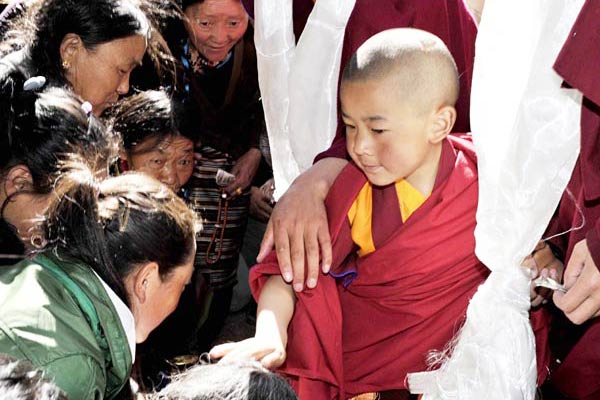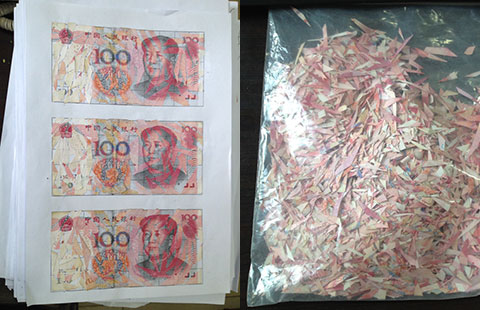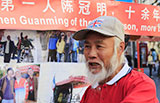Database launched to check identity of Living Buddhas
By XU WEI (China Daily)
Updated: 2016-01-19 02:36
 |
|
Dedrug-Jamyangxerabpaldan (right), the reincarnated soul boy of the 5th living Buddha Dedrug-Jampalgalsanggyatso, who passed away in March 2000, disperses his blessings on a recent day in Draipung Temple by touching people's heads. The temple is in Lhasa, capital of the Tibet autonomous region. The 7-year-old boy became the incarnated successor of the 5th living Buddha following a 10-year search. [Photo provided to China Daily] |
An online database of legitimate Living Buddhas was launched at a ceremony in Beijing on Monday to help followers of Tibetan Buddhism distinguish between real ones and fakes.
The database has been set up amid concerns about fake Living Buddhas defrauding followers.
Launched by the Buddhist Association of China at the Guangji Temple in the capital, it will include the names, dates of birth, sect of the religion, the numbers on Living Buddhas’ certificates and photographs of each Living Buddha.
The database has initially disclosed information on the 870 Living Buddhas in Tibetan Buddhism. Information about more Living Buddhas will be made public once their status has been certified, the association said.
It is the first time that China has made such information public.
The database will be available on the websites of the association, the State Administration of Religious Affairs and the news portal Tibet.cn. It is available in both Chinese and Tibetan.
The database was launched after an incident involving Baima Aose, whose original name was Wu Darong, during which he held what was purportedly a Living Buddha enthronement ceremony for Chinese actor Zhang Tielin.
He later issued an apology and resigned from all posts after a Tibetan Buddhist monastery in Sichuan province refused to certify him as a Living Buddha.
The 7th Drukhang Living Buddha Drukhang Thubten Khedrup, vice-president of the association, said at the launch ceremony that the database will help to prevent similar cases and assist in protecting the interests of both followers and Living Buddhas.
“It will also help society to better learn about Tibetan Buddhism and Living Buddhas,” he said.
Venerable Master Xuecheng, the association’s president, said it is considering expanding the database soon to cover information about all 72,000 Buddhist monks in Chinese Buddhism.
Tibetan Buddhism holds that the soul of a Living Buddha is reincarnated in a child on death. The reincarnation procedure is strict and lengthy, and a candidate must obtain government approval before the enthronement ceremony.
- KMT says it's time for review after rout in vote
- Database launched to check identity of Living Buddhas
- China's securities watchdog denies resignation offer from chairman
- China's railway numbers are envy of the world
- Chinese rank among world's wealthiest 62
- Students balk over pledge of sex fidelity
- Chinese science awards to emulate Nobel Prize
- 1992 Consensus stressed by mainland after Taiwan poll
- Experts mull introduction of tougher regulations on lab animal welfare
- College established to fight terrorism







